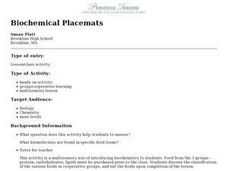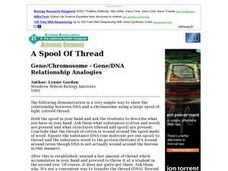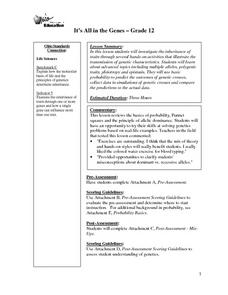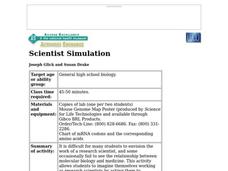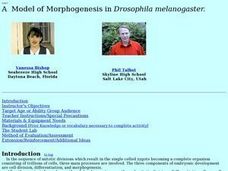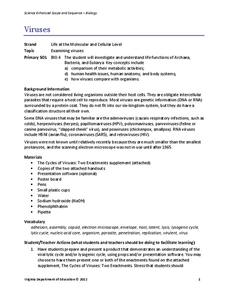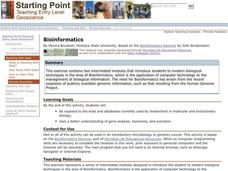Curated OER
Biochemical Placemats
Learners group various foods according to whether they are proteins, carbohydrates, or lipids. This activity is a multisensory way of introducing students to biochemistry. Learners also learn how icons represent the molecular composition...
Curated OER
A Spool Of Thread
Pupils describe a spool of light colored thread that the teacher holds in his/her hands. They are asked what substances (cotton and wood) are present and what structures (thread and spool) are present. The teacher conclude that the...
Serendip
From Gene to Protein - Transcription and Translation
Learners identify the different steps involved in DNA transcription. In this genetics lesson, pupils complete a worksheet and model the translation process with a paper chain activity. They watch a video on sickle cell anemia and explain...
Curated OER
It's All in the Genes
Twelfth graders investigate the inheritance of traits through several hands-on activities that illustrate the transmission of genetic characteristics. Students study advanced topics including multiple alleles, polygenic traits,...
Curated OER
DNA and Genes
Students analyze the structure of DNA. They describe how the structure of DNA enables it to reproduce itself accurately. Students discuss genes and the sequence of nucleotides occur in DNA.
Curated OER
Scientist Simulation
Learners imagine themselves working as research scientists completing the end-steps of a molecular research project and interpreting the data. They compare the gene sequences of normal and abnormal mice and evaluate the protein product...
Curated OER
A Model of Morphogenesis in Drosophila Melanogaster
Students investigate the following scientific terms and ideas: rates of diffusion, the role of morphogens in the development of larva, the chemical dynamics of a cell, and the significance of embryo polarity during development.
Virginia Department of Education
Physical and Chemical Properties of Water
How can you effectively provide detailed concepts of water properties to your high school class in a way they find exciting and challenging at the same time? By letting them play, of course! Through a variety of experiments, pupils...
Virginia Department of Education
The Effects of Heat and Acid on the Enzyme Catalase
How quickly do enzymatic reactions occur? Assist the class as they examine heat and pH change to determine the rate of chemical reactions using catalase as an enzyme. Watch them "glow" with excitement!
Virginia Department of Education
The Cell Cycle and Mitosis
What a packed lesson! Provide your class with the opportunity to learn about the cell cycle in several exciting ways. Biologists first learn about the theory behind mitosis, then proceed to view onion tips under the microscope and create...
Virginia Department of Education
Viruses
Germs, parasites, and viruses, oh my! Facilitate a lesson on viruses as individuals explore functions of Archaea, Bacteria, and Eukarya. They learn how viruses compare with other organisms in nature and how they contribute to health...
Curated OER
Bioinformatics
Students are exposed to the tools and databases currently used by researchers in molecular and evolutionary biology. They gain a better understanding of gene analysis, taxonomy, and evolution.
Curated OER
Bacterial Transformation Kit
Students participate in an experiment in which they practice moving genes from one organism to another. They examine the results of a recombination of jellyfish. They identify different types of bacteria as well.
Virginia Department of Education
Macromolecules
Finally, a chance for the class to play with their food! Allow pupils to simulate stomach acid with common foods, and introduce specific macromolecules into the mixture to explore characteristics of carbohydrates, lipids, and proteins....
Virginia Department of Education
DNA Structure, Nucleic Acids, and Proteins
What is in that double helix? Explain intricate concepts with a variety of creative activities in a activity that incorporates multiple steps to cover DNA structure, nucleic acids, and proteins. Pupils explore the history of DNA...
Virginia Department of Education
Structure and Function of Cell Membranes
Lead your high school class on an exploration inside the cell. Individuals investigate the relationships between cells structure and function given their relative locations on the cell membrane. They explore the concept of homeostasis...
Virginia Department of Education
The Ratio of Surface Area to Volume
Demonstrate the ratio of surface area to volume in your high school class by using phenolphthalein, gelatin, and an onion. Intrigue the class by leading a discussion on osmosis and diffusion, then making "scientific jello." Participants...
Virginia Department of Education
Genetic Variation and Mutations
Young scientists demonstrate their creativity while completing several activities, to assess genetic variations and mutations. Instructors provide a list of options and scientists choose to write a comic strip, create a book, construct a...
Virginia Department of Education
Biotechnological Issues and Bioethics
Culminate a bioethics unit with the implementation of a lesson that incorporates the Socratic method to encourage class feedback and participation. Pupils participate in a discussion on bioethics and morality, complete a writing seminar,...
Virginia Department of Education
Mendelian Genetics
How did Mendel know which pea plants would demonstrate certain characteristics? Pupils explore the answer this question, among others, as they complete Punnet squares, research dominant and recessive traits, and explore hereditary...
Virginia Department of Education
Meiosis
Intrigue the class by completing a lesson plan on meiosis, filled with challenging and insightful activities to spark the interest of every person in the room. Each member of the class learns about genetic disorders due to faulty...
Curated OER
Separating a Starch-Glucose Mixture Using Gel Filtration
High schoolers experiment using the basic principles of gel filtration. They use the gel filtration technique for testing for the presence of specific substances. Students discover that starch is a larger molecule than glucose.
Curated OER
How Mutations Lead to Changes in Cell Structure and Function
Students investigate how mutations lead to changes in cell structure and function. They construct an oligonucleotide, identify a protein sequence, design a step-by-step mechanism of how they think cells repair damaged DNA, and prepare...
Curated OER
Characterization of the Bioluminescence (Lux+) Gene E. coli
Students grow E. coli strain HB101, which contains the plasmid pUCD607 with the bioluminescence (Lux+) gene. The plasmid containing the Lux+ gene is isolated from the E. coli, then characterized by restriction analysis.
Other popular searches
- Cell and Molecular Biology
- History of Molecular Biology
- Molecular Biology Software
- Molecular Biology Models
- Molecular Biology Organic
- Evolutionary Molecular Biology
- Molecular Biology of Gene
- Cellular Molecular Biology
- Molecular Biology Vido
- Molecular Biology Vi Do
- Cellular and Molecular Biology
- Molecular Biology Video


